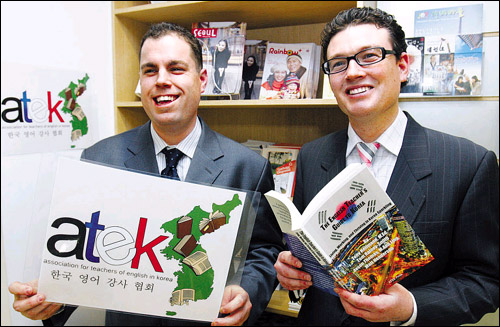By Iwazaru
This is Part 2 in an ongoing series about ATEK. Read Part 1.
I shall assume that your silence gives consent. —Plato
Be constructive or be silent. — Former ATEK president Greg Dolezal
Back in March of 2009, ATEK’s spokesman Tony Hellmann promoted the “Equal Checks for All” campaign, declaring that “…all teachers should have the same standard that Korean teachers have: no drug tests and no HIV check.” The campaign was part and parcel of ATEK’s mantra and Hellmann, as its voice, set himself up for any criticism. Much of the criticism came because ATEK seemed focused on the E-2 crowd and the checks it faced.
To begin, some expats with visas other than the E-2 opposed the “Equal Checks” for both sensible and self-serving reasons—they’d married a Korean citizen, had a master or doctorate degree, or some other condition that provided an exemption for the common work visa. Why should they be subjected to HIV/Drug tests in addition to full physicals and the hassle of obtaining an FBI check? Hellmann shined the spotlight on them and picked a fight, one that would mainly pit him against those who’d comfortably settled in South Korea for the long term and had no time for some fledgling organization rocking everyone’s boat. The forums lit up with vitriol and debate with Dave’s ESL serving as a boxing ring where blows were traded (these spats already had an established history).
Hellmann held fast and then put together “The English Teacher’s Guide to Korea—Living, Working and Thriving in Korea Sparkling” whose title rubbed some people the wrong way as the subtitle read like a sort of tourist slogan which, in regards to “Korea Sparkling,” it was and is. The fact that ATEK had received a government grant for the printing of the 347-page book didn’t help things much. Did this mean that the authors—Rainey-Smith, Thomas and a Matt Henderson were also listed on the cover—changed certain details to better appeal to the Korean view of things? The book examines and offers interpretations of many

topics from culture and “Education System Strengths” to “Stadiums” and “Employer/Employee Disputes.” Critics of Hellman and ATEK pounced on this as another blunder.
Hellmann allegedly dismissed the criticism as “whining” which sent some searching for further faults. And they didn’t have to look far. Within no time someone discovered that parts of the guide had been lifted directly from Wikipedia. A mistake blamed on Hellman who claimed “some statements were not properly attributed.” Other parts of the guide came under scrutiny for their similarity to other sources including the Royal Asiatic Society and the Korea Times. Bottom line: Another misstep by someone who contended to represent all expat teachers in Korea, whether they wanted it or not. Hellmann carried on for about a week saying that the errors of origin would be corrected until ATEK got smart and issued a press release declaring his resignation: “This was a personal and extremely difficult professional decision,” Hellmann said. “I seem to have become a focal point for negativity, so I’m stepping down as communications director.” It was Sunday, May 10, 2009. Sixty-one days from the official ATEK launch, Hellman was done but his detractors weren’t.
One has to wonder what Hellmann was considering in the first place when he agreed to join the ATEK board as the spokesman. This wasn’t some local, smalltime outfit. It would be taking up and on serious issues and people from the HIV/drug tests to the Immigration Office and National Assembly members. But, ironically, it wasn’t the Koreans who smoked him out. It was fellow expats digging into his past (pre-Korea) who opened up the closet door that was left slightly ajar. The skeletons that stood behind the door painted a picture of a man aware of trouble and litigations, a man who certainly wouldn’t want to draw attention to himself, especially at a time when Koreans were on the hunt for any single instance of unethical expat conduct. His critics dug deep as Hellmann refused to just pack it in or retreat into anonymity—hallmarks of the common sociopath which Hellmann would have known as a graduate of Penn State University with an MA in Counselor Education.
As a countermove he tried to bully and intimidate some individuals who posted disturbing details about his past on the Web, mainly exposing his legal issues in America. One of them, Mike Yates, 34, a consultant from England who lives in Seoul with his Korean wife, was relentless in his pursuit of Hellmann’s past. This infuriated Hellmann who increased his threats. As spring turned to summer, he kept on threatening litigation against Yates basically asking for a payoff and capitulation, or else (else being any number of things including defamation charges, large legal costs and possible visa problems).
On July 4, Yates found out that a criminal complaint had been filed against him and in September, is informed that it’s a libel charge. Things carried on through 2009 into 2010 with police interviews, attorneys (for Hellmann), and the filing of a 150-page dossier (by Yates). One incident, of many, struck Yates as surreal: Hellmann says he is not “that” Hellmann after information surfaces that he also goes by James A. Hellmann which is the name that led detractors to his spotty past. Yates is summoned to the police station to address the denial where he produces a copy of a resume with a photo of Hellmann that he found online which the police quickly match with Hellmann’s immigration records. Yates’ Korean interpreter allegedly slammed his hands on the table declaring the gotcha moment and, hopefully, an end to the charade.
When asked why he went after Hellmann, Yates refers back to the founding of ATEK and the “Equal Checks for All” campaign: “They said they represented all teachers in Korea but they didn’t represent me and a lot of other teachers,” he said. “I told him to stop saying it.” Yates, an F visa holder, was irritated by “Equal checks” because it seemed like the wrong way to approach the problem. “They couldn’t say ‘We don’t want to do it’ so they said everyone else should do it,” said Yates.
The plagiarism incident further confirmed Yates’ beliefs. “Again, I thought, this guy should not be representing us,” Yates said. Yet it was a churlish and spurious accusation followed by a simple challenge that most emboldened and enraged Yates. “He wrote some random comment out of nowhere saying ‘you beat your wife’ and then said ‘if you think you can take me on, try,” said Yates. “So, I did.”
In March 2010, Yates is notified by the prosecutor that he had not broken any laws. He credits the advice of a Korean relative who’s an attorney, though his own fortitude played a greater role. Hellmann has left the country.

Throughout the ordeal Yates was doubted and badgered by bloggers Hellmann had befriended and bamboozled. Some of the fault-finding was direct and some was in the form of praise for Hellmann’s heroic plight. One of the most prominent and longest running expat bloggers in Korea e-mailed Yates several times telling him, among other things, to “shut up.” Another, posted a sophomoric rant dripping with encomium that literally compared Hellmann to Batman (which the blogger later confuses with Spiderman), refers to Hellmann as “a buddy” and “pal” and tells those who are “digging up another character attack” to get “out of the fucking way.” Still another blogger who runs one of the well known Korean food blogs went on a scathing rant during a Seoul Podcast about “someone” (clearly Yates) who was calling out Hellman. Later, that same blogger apologized in a second podcast during which one more prominent blogger called ATEK detractors “house niggers.”.
Months later, after everything played out, not one of them had a word of apology for Yates or for their antics. Meanwhile, ATEK beat the drum of a “new start,” saying that it was working “to make the way we do things better,” according to National Membership Director, (later National Internal Communications officer or ICO). But it still had Hellmann all over its Web site. Even today Hellmann is in a story on the front page under the “Hot Topics” section titled “Korean Human Rights Commission.” Is this a wise way to react to a revelation that could shake the foundations of ATEK and damage the reputations of teachers all across the peninsula? Perhaps this is a clear example for why Yates and many others have said they don’t want ATEK representing them.
One Step Forward, Two Steps Back
Among its old and new problems, ATEK has had moments where people were around long enough to effect positive changes. Or at least they tried (which may be all they can do because there aren’t any easy battles on the list). If ATEK represents teachers hailing from America, the UK, Australia, Ireland and Canada, among others, they represent a reputation—whether fair or not—that is checkered at best.
For any good that expats do—volunteering at orphanages, children’s centers, in cancer wards, for habitat for humanity and so on—it takes only one scandalous, offensive, reckless act to put them in the prepared place that Koreans have for them. The groupthink, herd-bound, conformity-driven social structure in Korea has little tolerance or time for those whom stray or err. The reverberations from a single event can and do last for years like a stamp on the collective Korean consciousness. Look back at the last decade and at least two events still fester. First is the June 13, 2002 U.S. military training accident that killed two 14-year-old Korean girls, Shim Mi-son and Shin Hyo-sun. Two soldiers, Sergeant Mark Walker, and Sergeant Fernando Nino, faced charges of negligent homicide but were eventually acquitted. A defective communication device that prevented one of the soldiers from communicating the presence of the two girls walking on the side of a narrow country road was blamed for the accident. Second is the 2005 public uproar over news of a torrid party in Hongdae, the college clubbing area of Seoul, where frisky foreign guys (mostly Caucasian) groped and flaunted young Korean co-eds (some in wet t-shirts) for the cameras. The party was held by a guy known as “the Player” who had an “Ask the Player” post on the English Spectrum Web site which, among other things (like giving advice on how to hook up with chicks), served as a job hunting site for English teachers.
Both incidents fed xenophobia and fortified nationalism. The first had Koreans viewing foreigners as possible Americans and, therefore complicit in murder. Large candlelight vigils and widely circulated funeral photos of the  two girls stoked the flames and some public assaults of expats occurred. Numerous apologies from the military and a call from President George Bush did not ameliorate the situation. The event itself is credited as one reason presidential candidate Roh Moo-hyun won a narrow election—he attended some of the rallies and firmly established his anti-American stance. (A thorough analysis of the events can be seen here).
two girls stoked the flames and some public assaults of expats occurred. Numerous apologies from the military and a call from President George Bush did not ameliorate the situation. The event itself is credited as one reason presidential candidate Roh Moo-hyun won a narrow election—he attended some of the rallies and firmly established his anti-American stance. (A thorough analysis of the events can be seen here).
The second had, seemingly, a longer lasting effect. If the Army incident reaffirmed the distrust of America’s military presence here and the deeper desire for absolute independence, then the Player Party struck at the heart of the Korean suspicion that young foreign men are here to corrupt, sexualize and deflower innocent nubile Korean girls.
Moreover, the “Player” episode spawned what is known as Anti-English Spectrum (AES), a vigilante Korean group made up of a handful of hardcore leadership figures joined by several hundred members who seek to gather and disseminate information about “problem” English teachers with the ultimate goal of deportation. AES has been relentless in its campaign harnessing that innate suspicion of expats while pointing out intermittent events like a drug bust or the news that a convicted pedophile like Christopher Paul Neil taught in the country for the a stretch. AES’s volunteer manager Yie Eun-woong even goes as far as reportedly tailing teachers to confirm illegal or unethical activity. The group mainly exaggerates and exacerbates any information that builds the case against evil English educators residing in South Korea.
Such is the arena that ATEK entered, one littered with potential pitfalls and critics eager for the next fall in order to reaffirm an already established belief. ATEK’s admirable attempt to take on the prejudice and vitriol of AES showed just what it was up against: the National Human Rights Commission of Korea dismissed the request pointing to a local police department which subsequently closed the investigation. It is reported that law enforcement appreciates some efforts of AES given that the group acts a bit like an arm of the law in cases where the law may not have the manpower
Efforts to alter E-2 visa requirements, if anything, were more productive in that they got people talking, whether opponents or proponents. Nonetheless, in a country where officials at the Ministry of Justice say things like, “Drug use and other criminal activities carried out by foreign English teachers have been a social issue for some time, and have built up to dangerous levels in recent years,” when no such statistical evidence exists, the battle lines can’t be ignored.
Given this background, dropped balls and abandoned opportunities scuttle the cause. Two examples of reverse progress stand out among a growing list. The most recent is ATEK’s representation on the Seoul Metropolitan Police Agency’s (SMPA) “Foreign Affairs Advisory Committee” which began in the summer of 2010 when Mark Barthelemy (then Communications Officer for the Seoul PMA and Chair of the Press & Media Committee on ATEK’s National Council) attended the first meeting on June 17 where members gave statements and asked questions that were then addressed by SMPA officials.
Barthelemy was then invited by the SMPA’s Foreign Affairs Division to act as a guest presenter at the “Multicultural Training Program” lecture series. In an ATEK press release Barthelemy expressed his feelings about the opportunity: “It is a great honor to participate in these trainings and to represent ATEK on the committee,” he said. “SMPA’s willingness to reach out to expat communities is a major step forward. Giving ATEK’s members a voice will enhance the city’s readiness, and will boost Seoul’s image as a truly world-class city that welcomes people from everywhere.” Barthelemy’s bilingual presentations at the lecture series were commended by Deputy Director of Foreign Affairs , Choi Ho-ryul, who said, “Mark’s entertaining and informative presentation provided our field officers with invaluable advice for engaging expat residents and tourists across cultural and language barriers.”
ATEK’s president at the time, Greg Dolezal, expressed approval for Barthelemy and the commission saying, “I’m confident that Mark will be an asset to the SMPA as he is to us.” Dolezal also expressed hope that the relationship would benefit ATEK’s mission: “We expect him to report to us often and share his insights so we can improve our organization and help more teachers.” This gave ATEK a direct connection with the largest police body in the nation and a chance to have a voice when teachers run up against legal trouble. Understandably ATEK publicized this important achievement.
So less than a year later, how has the relationship developed? First, according to Barthelemy, he is no longer a member of ATEK. “My work and personal commitments grew such that I found myself without sufficient time to contribute to the organization in a way that was up to my own personal standards,” Barthelemy wrote in an e-mail. When asked what happened to the connection with the SMPA, Barthelemy answered, “I’m not sure of ATEK’s current relationship with SMPA as I am no longer involved with ATEK affairs.”
However, inquiries to ATEK about the commission referred to Barthelemy as “ATEK’s Mark Barthelemy.” Rachel Bailey, ATEK’s National Communications Officer wrote in an e-mail, “To my knowledge, the Seoul Police have not called another meeting of the commission since the summer. I do know that the Seoul Police have sought out ATEK’s Mark Barthelemy for consultation at least once since last summer’s meeting of the commission.”
Lieutenant Kim of the SMPA’s PR Department provided information which, although slightly ambiguous, confirmed that ATEK is not on the commission. “The Foreign Affairs Advisory Commission is composed of commissioners, which means an organization cannot be a member of the commission,” said Kim. References to Barthelemy were met with obliviousness. One thing is for sure: if Barthelemy is no longer a member of ATEK and he was the only connection that they had to the commission, then ATEK is no longer on the commission. Bailey’s reference to Barthelemy in regards to the commission confirms this.
Thus what could have been a major accomplishment and benefit for present and future members of ATEK, has been squandered. Any current or former members of ATEK reached about Barthelemy praise his efforts and professionalism—it is clear his departure left a void. Sources inside the organization who spoke on the condition of anonymity assert that he did not leave completely because of other commitments but because of the same infighting and bureaucratic balderdash that has plagued ATEK since the beginning. “He was run out of the organization because of Bylaw technicalities,” said one member of the leadership. National Internal Communications Officer Russell Bernstein who was also the former National Membership Director and Chair of the Seoul PMA came up more than once in relation to Barthelemy’s exit. Bernstein’s name surfaces often in any discussion of ATEK as someone who played an integral part in both building up and tearing down aspects of the organization before leaving to start a non-profit or NGO for “athletic, professional, and social development called Global Team Players.” Bernstein’s leadership style is described as domineering, intrusive and dictatorial by numerous ex-members of the association. And his role—along with President Oh’s—in the recent collapse of and exodus from the Seoul PMA provides a case in point for ATEK’s chronic leadership failures.
 Print This Post
Print This Post









